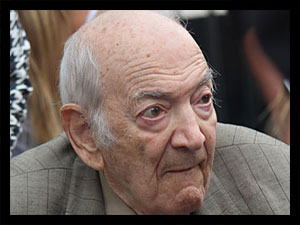Viktor Korchnoi – 23 March 1931 - 6 June 2016
By Frederic Friedel
Viktor Korchnoi was a professional chess player, one of the strongest grandmasters
in the world, twice World Championship challenger, the strongest player
never to have won the title. He was also, in recent years, the oldest active
grandmaster on the tournament circuit.
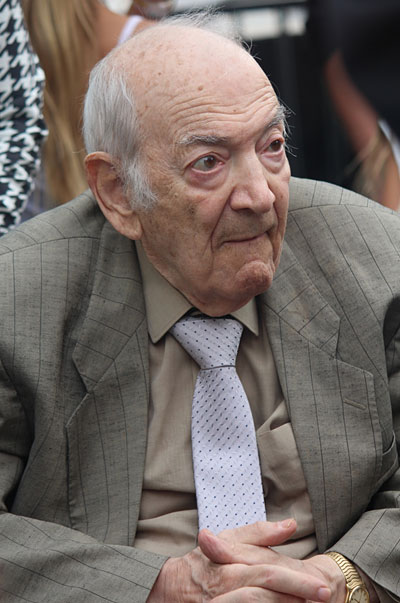
Viktor Lvovich Korchnoi was born on 23 March 1931 in Leningrad, Soviet
Union, to a Jewish father and a Catholic mother. He learned to play chess
from his father at the age of five. He graduated from Leningrad State University
with a major in history.
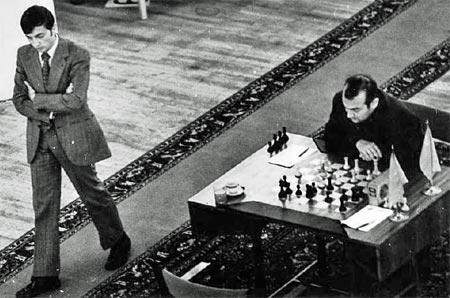
In 1974 Korchnoi lost the Candidates final to Karpov, who became the Challenger
and was declared world champion when Bobby Fischer refused to defend his
title in 1975. After that Korchnoi won two consecutive Candidates cycles
to qualify for World Championship matches against Karpov, in 1978 and 1981.
He lost both. In total Viktor Korchnoi playing in ten Candidate tournaments
(1962, 1968, 1971, 1974, 1977, 1980, 1983, 1985, 1988 and 1991). He was
also a four-time champion of the Soviet Union. In September 2006, he won
the World Senior Chess Championship.
In 1974 it became clear that a campaign was under way in the USSR to promote
Karpov over Korchnoi. The central authorities prevented him from playing
international tournaments, or even in Estonia, which was part of the Soviet
Union. He was Korchnoi was allowed to play in the tough 1976 IBM Amsterdam
16-player round robin, probably in order to prove that he was not so strong,
and that Karpov was a worthy World Champion. Korchnoi was the joint winner
of the tournament along with Tony Miles, both scoring 9.5/15 points.
At the end of the tournament, Korchnoi famously asked Miles to spell "political
asylum" for him. He became the first strong Soviet grandmaster to defect
from the Soviet Union. He had to leave his wife and son behind. He resided
in the Netherlands for some time, moved to West Germany and then eventually
settled in Switzerland by in 1978. He continued to play chess, and in 2009
became the oldest player ever to win a national championship, when he won
the Swiss championship at age 78.
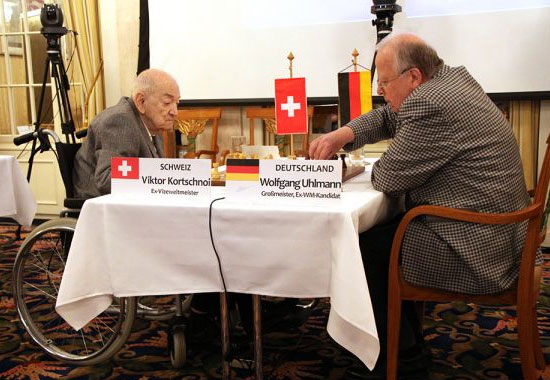
In 2012 he suffered a stroke and the general opinion was that he would
never play competitive chess again. Still he continued to give simultaneous
exhibitions and in 2015, bound to a wheelchair, he played
a match against German GM Wolfgang Uhlmann. He attended the 2016 Zurich
Chess Challenge earlier this year, but was not able to play anything himself.
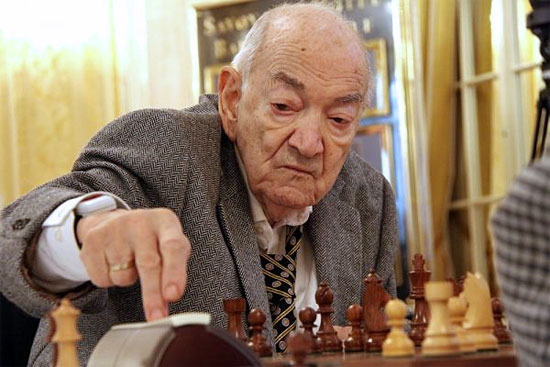
On a personal note
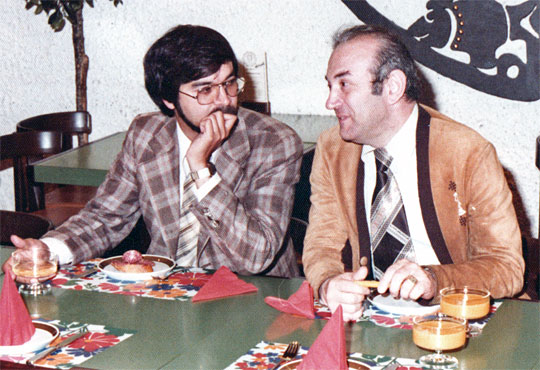
I got to know Viktor Lvovich shortly after his defection, when he visited
Hamburg. We got on well, shared a slightly deviant sense of humour, with
myself enjoying his sometimes caustic and rude remarks. He always spoke
to me in German, even if I started the conversation in English.
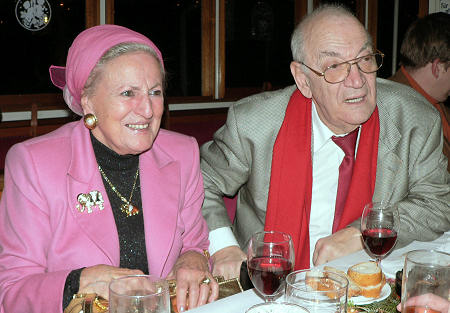
Viktor Korchnoi and Petra at the ChessBase
Christmas dinner in Hamburg
At some stage I got to know his wife Petra, who quickly became one of my
best friends in the chess world. I have always sought and enjoying her company,
joking and flirting. I know her harrowing life story, how her life was interrupted
by captivity and a decade-long incarceration in a Soviet concentration camp
in the Arctic Circle immediately after the war. Hers is a life story that
must be told – and will be sometime in the future.
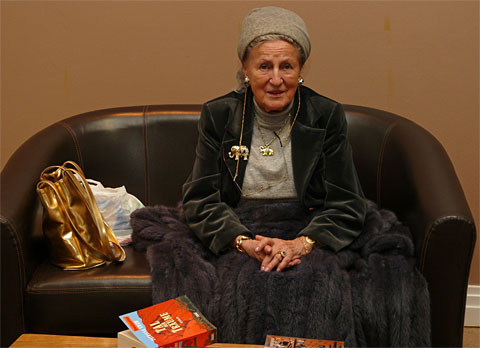
When I met Viktor and Petra in Zurich in February this year, he was frailer
than I had ever seen him before. When he saw me he simply smiled and shrugged
his shoulders: "What you gonna do?" was the meaning of that shrug.
Petra, who is a couple of years older, was also uncharacteristically shaky,
and I found myself helping her to her armchair or through doors. When I
commented on Victor's feebleness she said to me: "I only hope he dies
before me, Frederic." "Why?" I protested. "Because I
do not know who could care for him if I am gone."
Some memories
There will me many stories following this somewhat rushed eulogy. Our editors
are already working on them. I myself could go on all night, but will restrict
myself to pointing our readers to a few of the great number of article we
have published on this great man over the years.
Viktor Korchnoi's 80th Birthday Celebration
2011, Viktor Korchnoi turned 80. There was a week of celebrations, held
mainly in Zurich, which is not far from where Viktor Lvovich and his wife
Petra live. The celebrations were kicked things off with a clock simul by
Korchnoi, and then a gala dinner in his honour. Guests included Mark Taimanov
and Garry Kasparov.
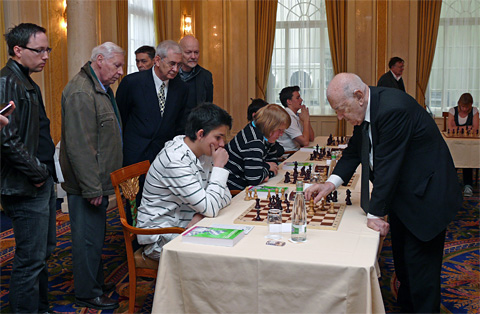
Above you see the man for whose 80th birthday all this had been organised,
already hard at work himself. Viktor Korchnoi was playing a clock handicap
simultaneous exhibition against ten talented youngsters from the Swiss Youth
team. Absolutely amazing.
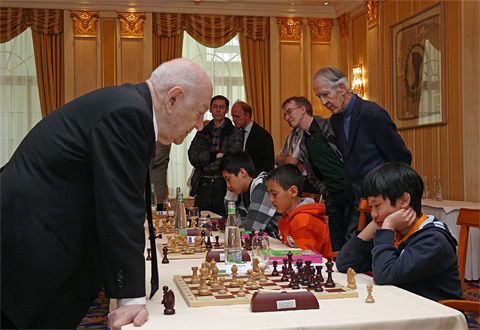
Incidentally, I came down to the Festival Hall, where the simul was under
way, with a message from another guest: if the eighty-year-old simultaneous
master was overcome with fatigue he could enlist the assistance of an unrated
player who was willing to jump in for him, for a move or two. However, Viktor
refused: he would do the job by himself. But thank you very kindly for the
offer, Garry Kimovich.
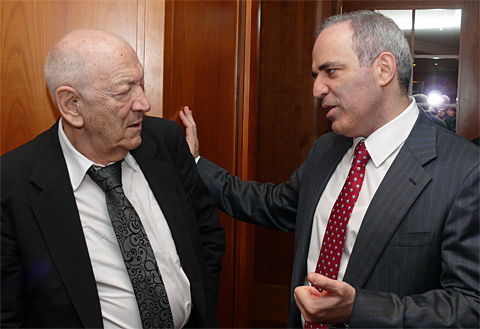
Viktor and Garry – for decades they
have shared a very affectionate relationship
And here are some picture of two great chess legends: below we see Viktor
in animated conversation with 85-year-old Mark Taimanov, who had come to
Zurich for the celebrations.
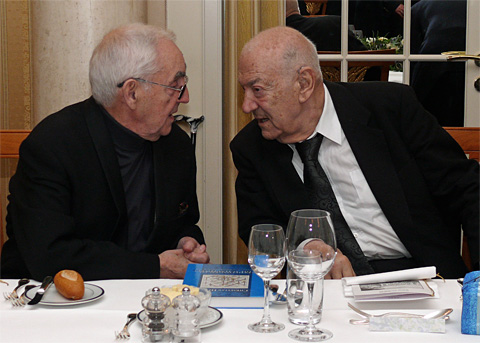
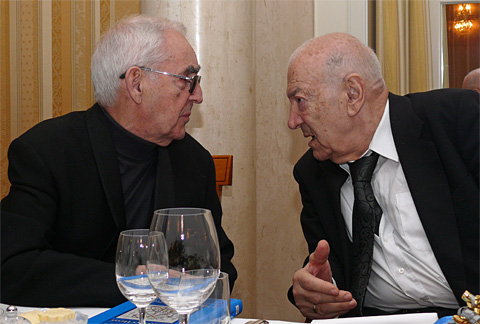
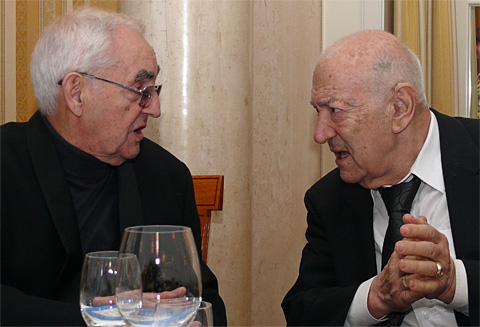
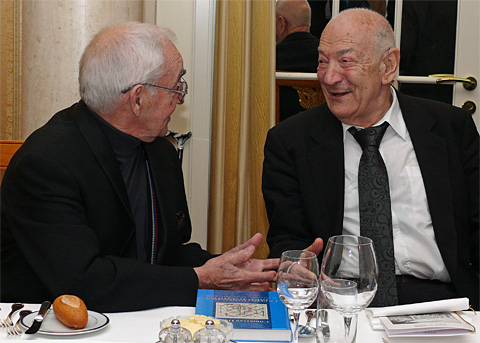
Viktor Korchnoi: My Life for Chess
In 2005, at the age of 73, Viktor visited us in Hamburg to record two fascinating
DVDs on a life devoted to chess – a career that spanned more than
five decades and six generations of opponents.
At the time, when we decided to make the DVDs, I was a bit nervous. Even
in normal conversation Viktor Lvovich was always very intense. No small
talk, any question or remark could elicit a profound, witty, or caustic
response. And since this was all done in a foreign language, and since he
was never willing to compromise his high standard of erudition, the conversation
was sometimes ponderous. You had to wait for many seconds while he thought,
he would pause mid-sentence and search for a word. He would even go back
and correct a previous sentence when a better expression has occurred to
him.
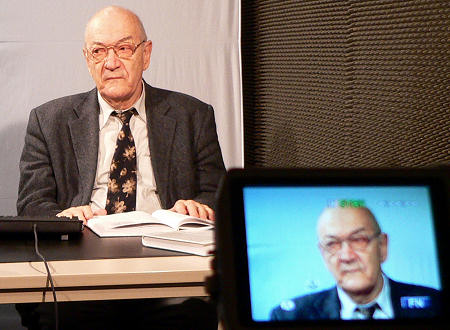
Viktor Korchnoi in Studio ChessBase in Hamburg
How would this play out in a video recording, where the speaker is expected
to be fluid and eloquent? It was with some trepidation that I took a seat
behind the camera in our recording session in the Hamburg “Studio
ChessBase” (where Garry Kasparov and others have made a series of
wonderful training CDs). Viktor had spent half an hour receiving technical
instructions, we had given him IM Oliver Reeh, just out of the picture,
to help with the computer operation when he needed it, and he had briefly
flipped through his new autobiography “Mein Leben für das Schach”
(My Life for Chess, Olms Verlag, 2004). Light, camera, and action!
It was unlike anything I had expected. Viktor Lvovich was completely at
ease, spoke powerfully, interspacing profundity with humorous moments, objective
chess analysis with scintillating historical narrative. The pauses were
there, the struggle for the mot juste. But he used it to dramatic
effect. You could feel the intensity, the uncompromising need to say exactly
what he was thinking. Let me give you a couple of impressions, literal transcriptions,
which of course fail to convey the verbal and facial eloquence, the sly
grins and wide-eyed stares. But it will give you a rough idea.
1967. In that year the Soviet state celebrated fifty years of, more or
less, its existence. It was the fifty year’s anniversary of the
so-called October Socialist Revolution. In order to commemorate this day
they organised two big international tournaments – one in Moscow,
one in Leningrad. Well, there were even rumours that Bobby Fischer was
ready, was eager to take part in one of these tournaments, without any
extra fee. Just to play. There were rumours. But the Soviet authorities
thought it over and decided not to allow him to come to the Soviet Union.
“What the hell would happen if an American citizen would win the
tournament commemorated to the fiftieth anniversary of the Soviet state?”
No, sorry, so the tournaments were played, the stronger one, in Moscow,
was won by Leonid Stein, and the weaker one in Leningrad was won by me,
in a fight with Grandmaster Kholmov, who was second. So I won several
interesting games, and I am going to show you one of them.
[Korchnoi starts to replay his white game against Mijo Udovcic, which
begins 1.d4 e6 2.e4]
Well, some time ago the then world champion Mikhail Botvinnik said that
a young player had to arrange his opening repertoire in a way that he
would never have to play against himself. What does it mean? It means
that if I play the Grunfeld with black against d4 and the French Defence
against e4, I should not play against the French myself. Somehow I had
to avoid openings which I play myself. But I got tired of playing closed
openings and decided to take the challenge. The guy wanted to play the
French against me, I take it! But if possible I would avoid the most modern
lines.
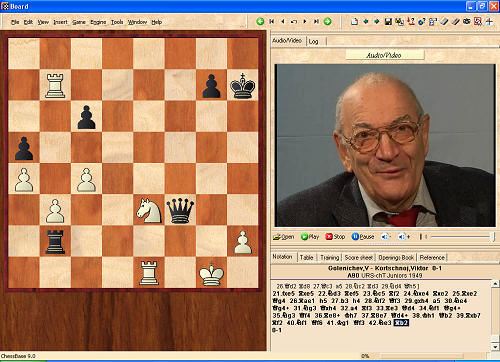
His Life for Chess on DVD – Viktor Korchnoi
narrates and annotates games
Another example? Before one session, I found Viktor Lvovich struggling
to find a player called Lowenfish in the Mega Database. After some moments
we discovered he was spelled Levenfish. Viktor expertly created a “players
dossier”, and I asked him whether he would be showing us a game against
Levenfish. “No,” he said, “I just need his exact date
of birth.” Mysterious. After this we recorded session number 16, which
starts with the following introduction:
I have played chess for more than fifty years. Some of my first opponents
were born in the 19th century. For instance in 1953 I played against Grandmaster
Levenfish, who was born in 1889 [aha!]. He won one of the games and was
very proud. He wrote: “Such a great tactician as Korchnoi overlooked
my very nice combination.” Yes, it was a nice game. Well, okay,
I played against Levenfish. Now in about one week I am going to Oslo where
I will face Magnus Carlsen, who was born one hundred and one years after
Levenfish, in the year 1990. Such a range – I believe I have played
against people of six generations!
In the year 1976, after the tournament in Hastings, I gave a simultaneous
display in London where I played against a selected team of juniors. Thirty
boards. It was not easy. I played for seven hours and fifteen minutes.
I won seventeen games, I drew twelve, and I lost only one, to a small
boy, whose name was Nigel Short. That was 1976. And now I am going to
show you a game from 1990, where I play against a future challenger for
the world championship, a future contender in the match against Garry
Kasparov. This is the game. [Shows us the game Korschnoi vs Short, Rotterdam
1990, 1-0 in 40 moves].
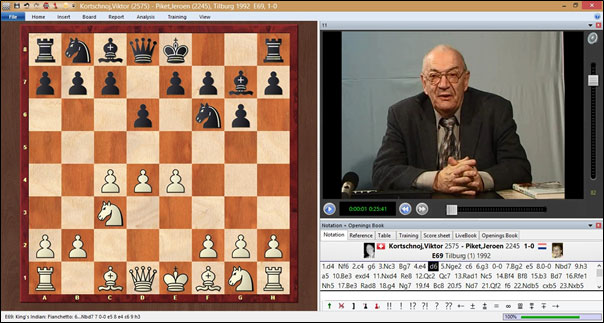
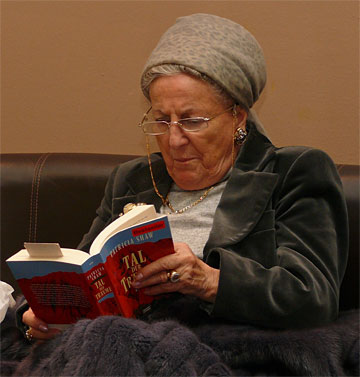
Petra, we are deeply saddened and our thoughts
are with you
Links
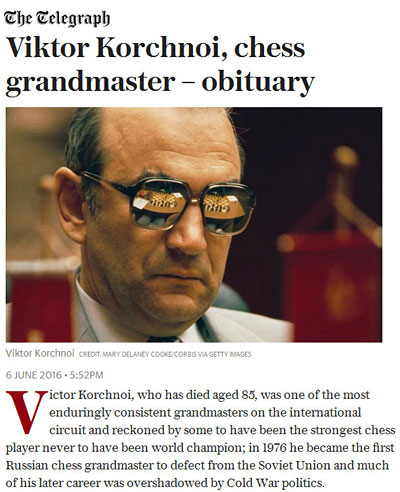
Read
the above obituary in The Telegraph
More obituraries
